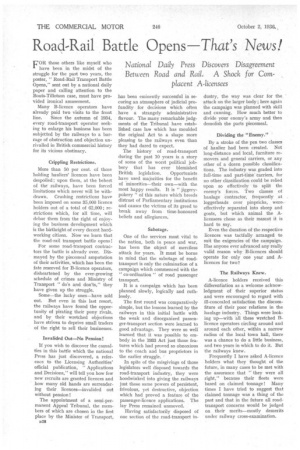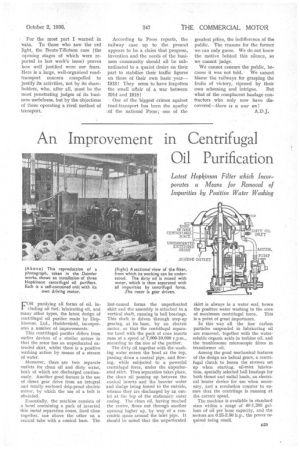Road-Rail Battle Opens—That's News!
Page 38

Page 39

If you've noticed an error in this article please click here to report it so we can fix it.
National Daily Press Discovers Disagreement Between Road and Rail. A Shock for Complacent A-licensees p'OR those others like myself who
have been in the midst of the struggle for the past two years, the poster, " Road-Rail Transport Battle Opens," sent out by a national daily paper and calling attention to the Bouts-Tillotson case, must have provided ironical amusement.
Marty B-licence operators have already paid two visits to the front line. Since the autumn of 1934, every road-transport operator seeking to enlarge his business has been subjected by the railways to a barrage of obstruction and objection unrivalled in British commercial history for its vicious obstinacy.
Crippling Restrictions.
More than 50 per cent. of those holding hauliers' licences have been despoiled; upon them, at the behest of the railways, have been forced limitations which never will be withdrawn. Crushing restrictions have been imposed OR some 35,000 licence holders out of a total of 62,000; restrictions which, for all time, will debar them from the right of enjoying the business development which is the birthright of every decent hardworking citizen. Now we learn that the road-rail transport battle opens !
For some road-transport contractors the battle is already over. Dismayed by the piecemeal amputation of their activities, which has been the fate reserved for B-licence operators, disheartened by the ever-growing schedule of crimes and Ministry of Transport "do's and don'ts," they have given up the struggle.
Some—the lucky ones—have sold out. But even in this last resort, the railways have found the opportunity of pirating their puny rivals, and by their wretched objections have striven to deprive small traders of the right to sell their businesses.
Invalided Out—No Pension!
If you wish to discover the casualties in this battle which the national Press has just discovered, a reference to the Licensing Authorities' official publication, " Applications and Decisions," will tell you how few new recruits are granted licences and how many old hands are surrendering their licences—invalided out without pension !
The appointment of a semi-permanent Appeal Tribunal, the members of which are chosen in the first place by the Minister of Transport, u28 has been eminently successful in securing an atmosphere of judicial profundity for decisions which often . have a strangely administrative flavour. The many remarkable judgments of the Tribunal have established case law which has moulded the original Act to a shape more pleasing to the railways even than they had dared to expect.
The history of road-transport during the past 10 years is a story of some of the worst political jobbery that has ever blemished British legislation. Opportunists have used majorities for the benefit of Minorities—their own—with the most happy results. It is " jiggerypokery " of this nature which breeds distrust of Parliamentary institutions and causes the victims of its greed to break away from time-honoured beliefs and allegiances.
Sabotage.
One of the services most vital to the nation, both in peace and war, has been the object of merciless attack for years. It must be borne in mind that the sabotage of roadtransport is only the culmination of a campaign which commenced with the " co-ordination " of road passenger transport.
It is a campaign which has been planned slowly, logically and ruthlessly.
The first round was comparatively simple, but the lessons learned by the railways in this initial battle with the weak and disorganized passenger-transport section were learned to good advantage. They were so well learned that it was possible to embody in the 1933 Act just those features which had proved so obnoxious to the coach and bus proprietors in the earlier struggle.
In spite of the misgivings of those legislators well disposed towards the road-transport industry, they were hoodwinked into giving the railways just those same powers of persistent, frivolous, yet destructive, objection which had proved a feature of the passenger-licence applications. The lay Press remained unmoved.
Having satisfactorily disposed of one section of the road-transport in
dustry, the way was clear for the attack on the larger body ; here again the campaign was planned with skill and cunning. How much better to divide your enemy's army and then demolish the parts piecemeal.
Dividing the "Enemy." ' By a stroke of the pen two classes of haulier had been created. Not long-distance and local, furniture removers and general carriers, or any other of a dozen possible classifications. The industry was graded into full-time and part-time carriers, for no other classification could be relied upon so effectively to split th€. enemy's forces. Two classes of haulage contractor, frequently at loggerheads over pinpricks, were. effectively separated into sheep and goats, but which animal the Alicensees chose as their mascot it is hard to say.
Even the duration of the respective licences was tactfully arranged to suit the exigencies of the campaign. Has anyone ever advanced any really valid reason why B-licences should operate for only one year and Alicences for two?
The Railways Knew.
A-licence holders received this differentiation as a welcome acknowledgment of their superior status and were encouraged to regard with ill-concealed satisfaction the discomfiture of their poor relations in the haulage industry. Things were looking up—with 'all these wretched Blicence operators circling around and around each other, within a narrow radius of the local town hall, there was a chance to do a little business, and two years in which to do it. But the railways knew.
Frequently I have asked A-licence holders what they thought of the future, in many cases to be met with the assurance that "they were all right," because their fleets were based on claimed tonnage ! Many times I have tried to suggest that claimed tonnage was a thing of the past and that in the future all roadtransport concerns would be judged on their merits—mostly demerits under railway cross-examination. For the most part I warned in vain. To those who saw the red light, the Bouts-Tillotson case (the opening stages of which were reported in last week's issue) proves how well justified were our fears. Here is a large, well-organized roadtransport concern compelled to justify its activities, not by its shareholders, who, after all, must be the most penetrating judges of its business usefulness, but by the objections of those operating a rival method of transport.
According to Press reports, the railway case up to the present appears to be a claim that progress, invention and the needs of the business community should all be subordinated to a quaint desire on their part to stabilize their traffic figures on those of their own basic year1913 I They seem to have forgotten the small affair of a war between 1914 and 19181
• One of the biggest crimes against road-transport has been the apathy of the national Press; one of the
greatest pities, the indifference of the public. The reasons for the former we can only guess. We do not know the motive behind this silence, so we cannot judge.
We cannot censure the public, because it was not told.. We cannot blame the railways for grasping the fruits of victory, ripened by their
own scheming and intrigue. But what of the complacent haulage contractors who only now have discovered—there is a war on!




















































































